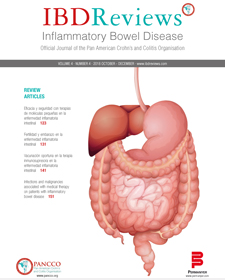Utility of Video Capsule Endoscopy and Device Assisted Enteroscopy in Inflammatory Bowel Disease
Contenido principal del artículo
Resumen
Introduction: There is no single gold standard test for the diagnosis of Crohn’s disease. The diagnosis is based on a constellation of findings: clinical history and physical examination, laboratory tests, radiologic and endoscopic examinations, and histopathology. Most patients diagnosed with Crohn’s disease have small bowel involvement. A colonoscopy with visualization of the terminal ileum may not identify involvement of the disease in proximal segments because of its patchy pattern. Complete evaluation of the small bowel is needed in order to establish a definitive diagnosis of Crohn’s disease and determine the extent and severity of the disease and its activity at baseline so it can be monitored. Objective: To review the role of video capsule endoscopy in different clinical situations of inflammatory bowel disease (IBD): suspicion of IBD; established IBD; unclassified IBD; ulcerative colitis (including ileorectal anastomosis); complications related to the use of video capsule endoscopy in IBD.

